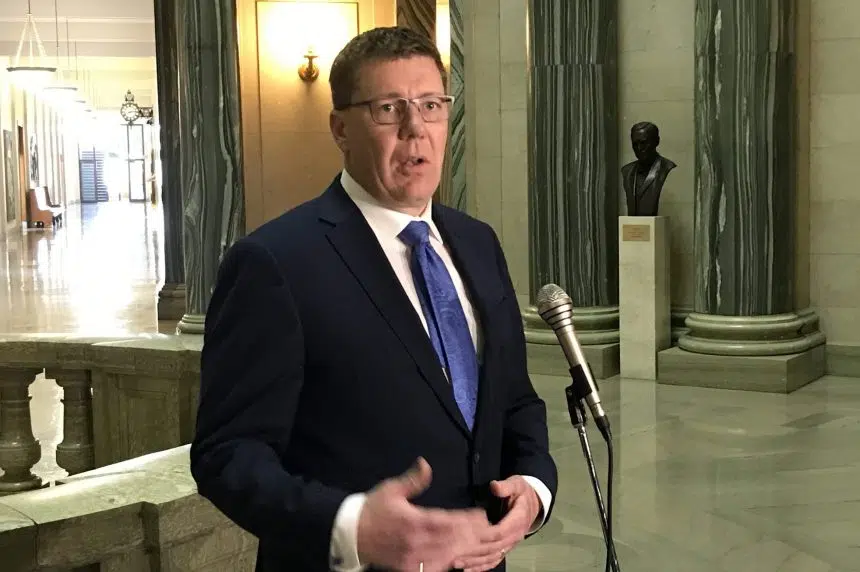On the heels of a harsh labour force survey released Thursday by Statistics Canada, the Saskatchewan government announced a financial aid package for some businesses in the province.
The Saskatchewan Small Business Emergency Payment is to provide $50 million to small- and medium-sized businesses that have been forced to close or scale back their operations due to the COVID-19 pandemic.
“Small- and medium-sized enterprises in Saskatchewan have been critical drivers of our economy and job creation over Saskatchewan’s last decade of growth,” Premier Scott Moe said during a conference call with the media, “and they will continue to create jobs and they will continue to drive growth in the years ahead once we are through this pandemic.”
The goal, Moe said, was to get a financial aid program up and running as soon as possible to get money into the hands of business operators quickly. Details and applications will be available on Monday.
According to the Statistics Canada report, 20,900 jobs were lost in the province between February and March, in large part because the pandemic forced the closures of some businesses.
The number of jobs decreased by 19,300 in March compared to March of 2019. The unemployment rate in the province from February to March increased by 1.1 per cent to 7.3 per cent.
Moe said those numbers highlight the importance of his government’s actions to support the province’s 150,000 small businesses, which he noted pay about a quarter of the wages in Saskatchewan and are responsible for 24 per cent of the province’s gross domestic product.
He’s well aware that the government’s response to the pandemic — including the order to close non-essential businesses — cost people their jobs. He expects additional job losses when StatsCan puts out its report for April.
Moe and his government know Thursday’s announcement won’t solve the problems businesses face, but he called the program “the first step in our economic recovery efforts.”
“What we are seeing today is an investment in small business — ultimately in the people that are employed by small business — to ensure that when we do get on the back side of this curve that we have the small business community in the province so that we can actually have an economic recovery,” Moe said.
The government’s new program is a one-time grant for businesses that will be based on 15 per cent of a business’ monthly sales revenue.
There’s a set maximum of $5,000 per business. The government said the grant is “not dedicated to specific cost pressures.”
“We did look at options, (like) whether to address very specifically elements of fixed overhead or whether to take a more flexible and broader approach that would give businesses the opportunity to deploy those resources in the way that they felt would best support their business,” said Trade and Export Development Minister Jeremy Harrison. “We opted for the latter approach.”
Businesses that have applied for assistance from the federal government can also get help under the Saskatchewan program.
To be eligible for the program, a business must:
Have been fully operational on Feb. 29;
Have ceased or curtailed operations as a result of the COVID-19 public health order;
Have fewer than 500 employees; and,
Commit to reopen following the cancellation of the COVID-19 public health order.
The province noted it will be asking the federal government to exempt the program from business income for tax purposes.
The program’s release was greeted warmly by business organizations, including the Saskatchewan Chamber of Commerce.
“We have been working with our members non-stop over the past month to better understand the unique challenges businesses are facing, and we continue to advocate for programs to support Saskatchewan businesses during this time of tremendous economic hardship,” chamber CEO Steve McLellan said in a media release.
“We welcome the news from the province and see it as a much-needed new tool for businesses to sustain their operations until things get back to normal.”
Students also getting help
The government announced $1.5 million in emergency funding for post-secondary students “with limited financial resources and supports whose studies and employment have been disrupted.”
The amount available to each student will depend on their individual situations.
The funding is available for domestic and international students via one-time bursaries that will be available from April 1 to Sept. 30.
“We recognize the need for urgent supports to help vulnerable students, including those from northern, remote and indigenous communities, as well as international students unable to return home,” Advanced Education Minister Tina Beaudry-Mellor said in a media release. “It is critical that we work with our institutions to help students who have nowhere else to turn.”
The government said eligibility requirements and application details will be available to students through their post-secondary educational institution within the next week to 10 days.
— With files from 980 CJME’s Lisa Schick







